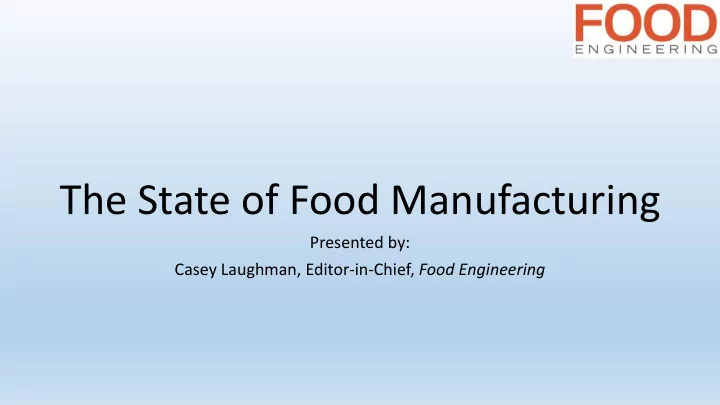

The State of Food Manufacturing Presented by: Casey Laughman, Editor-in-Chief, Food Engineering
State of the In Industry ry • Two-thirds of respondents expect increased throughput • More than a third say budgets for packaging, processing and production equipment are increasing • Almost 30 percent say budget for automation and control hardware and software is increasing; a third of those say their budget is increasing by more than 25 percent
Top 10 trends 1. Automation 2. Efficiency/maintenance/new equipment 3. Clean label/healthy foods 4. E-commerce 5. Food safety/FSMA 6. Decline in workers/worker availability 7. Sustainability 8. Consumer demand 9. Costs 10. Packaging
Automation • Controls, software, sensors and transmitters • Robots/cobots, with easier programming for operators • Data collection at more points throughout the production process • Mobile devices for data collection, wayfinding, employee and product tracking and tracing
Food Safety/FSMA • Recall/food safety management • Supply chain challenges • FSMA effects
Food Safety/FSMA Supply chain challenges • FSMA requires risk management for upstream risks • Processors can track ingredients inside their plant, but the steps of the supply chain are still a challenge • Blockchain may eliminate “one forward, one back”
Food Safety/FSMA FSMA effects • FDA is moving from education to enforcement • Tight fiscal controls can limit options for responding • Radiological risks are one particular area where companies are struggling
Decline in in workers/worker availability • Immigration • Skills and gender gap • Low unemployment rate
Decline in in workers/worker availability Immigration • Skilled workers are harder to find/get approved for visas • Unskilled workers are often undocumented or “documented” • If all immigration is restricted, workers of any skill level will become more rare • Finding citizens to do the jobs is still a challenge
Decline in in workers/worker availability Skills and gender gap • 2 million manufacturing jobs unfilled by 2025 • 21 percent of workers retiring in the next five years • Groups such as FIRST trying to fill the gap with robotics competitions to get young people interested • Engineering and other technical careers still seen as a “boy’s club”
Cannabis • When was the last time we saw an entirely new product market appear?
Cannabis • Technical challenges • Financial challenges • Regulatory challenges • Moral qualms
Where do we go from here? • Increased automation • New ways to address worker shortages • Challenges of accurately predicting consumer demand • Thinking of food manufacturing as manufacturing
Conclusion • This industry changes slowly until it doesn’t • Turning the cruise ship • Too big to fail? Or too big to succeed?
Recommend
More recommend